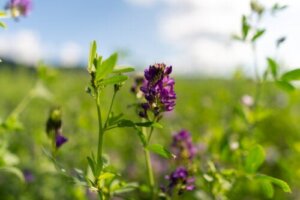Does Alfalfa Help Increase Breast Milk Production?


Reviewed and approved by the pharmacist Franciele Rohor de Souza
In traditional medicine, alfalfa (Medicago sativa) has been classified as a “natural galactagogue”, which means that it has the ability to increase breast milk production. According to its proponents, the phytoestrogens contained in the plant are behind these properties. However, this is still under investigation.
For now, the evidence in this regard remains limited. In fact, some side effects and interactions have been observed that should be considered before using this type of supplement. Want to know more about it? Read on!
What is alfalfa?
Alfalfa (Medicago sativa) is a perennial leguminous plant belonging to the Fabaceae family. For years it has been used in traditional medicine, as it’s a source of bioactive compounds including fatty acids, phytoestrogens, antioxidants, vitamins, minerals, and proteins.
In particular, its leaves and roots are used in the production of herbal supplements. Likewise, its seeds are used for food purposes. And, as detailed in a review shared in Pharmaceutical Biology, its phytoconstituents give it the following properties:
- Estrogenic
- Antioxidant
- Antiulcerous
- Antimicrobial
- Hypolipidemic
- Anti-inflammatory
- Neuroprotective
- Hypocholesterolemic
It is precisely this last property that’s linked to its ability to increase breast milk production. And although this traditional use persists and has been investigated, there are still doubts. Let’s have a closer look at the topic.

Find out more: Mixed Breastfeeding: Everything You Need to Know
Why is alfalfa said to help increase breast milk production?
The use of alfalfa as a breast milk stimulant dates back a long time. In folk medicine, supplements derived from this plant have been used among nursing mothers who, for varying reasons, required increased milk production.
Its phytoestrogen content is believed to be behind the galactagogue effect. These plant substances resemble estrogens and can bind to their receptors in the body. Despite this, the evidence is limited and inconclusive.
Information shared through the Drugs and Lactation Database notes that, although alfalfa consumption has been promoted as a galactagogue and is included in proprietary blends intended to increase breast milk production, there are no scientifically valid clinical trials to support such use.
Although it’s an important source of saponins, estrogenic isoflavonoids, vitamin K and L-canavanine (an amino acid), studies haven’t been able to corroborate that it can promote lactation.
Because of this, the same source states that these supplements should not replace the evaluation and advice on those modifiable factors that indicate breast milk production. In the face of this problem, dietary and lifestyle changes that do help are often suggested.
Is it risky to consume alfalfa to increase breast milk?
The U.S. Food and Drug Administration (FDA) considers alfalfa to be safe in most cases. But it warns that substances contained in this plant, such as L-canavanine, stimulate the immune system and tend to be harmful in patients with systemic lupus erythematosus.
Other warnings regarding its consumption are as follows:
- Alfalfa supplementation may result in episodes of diarrhea in mother and baby.
- Despite the lack of evidence on its potential as a galactagogue, its consumption isn’t recommended in women who have an excessive production of breast milk.
- Due to its vitamin K content, its simultaneous intake with anticoagulant drugs is disapproved.
- Its administration should be avoided if there’s a diagnosed autoimmune disease.
- Neither should it be taken if there are hormonal disorders. If so, a doctor should be consulted first.
- Alfalfa supplements in teas, capsules, and tablets are not regulated by entities such as the FDA. Therefore, there’s no endorsement of quality and purity. It’s important to purchase them from a reliable source.

Presentations and mode of consumption of alfalfa
In case you’d like to try alfalfa as part of your diet during lactation, it’s best to consult your doctor first. In general, the plant is available as food, an infusion, and in tablet form. The best way to take advantage of its properties is in its natural form.
Both sprouts and seeds can be incorporated in salads, soups, stews, and other preparations. Its cooked use is recommended to avoid risks of intoxication by E. coli. As for tea and tablets, they should be ingested according to the manufacturer’s instructions, without exceeding the recommended dose.
You may be interested in: How is breast milk produced?
Are there other ways to stimulate breast milk production naturally?
Low breast milk production is often a cause for concern. After all, it’s proven to be the best food for proper infant development.
So what to do about it? There are several suggestions:
- Start breastfeeding as soon as possible, preferably one hour after delivery.
- Give milk frequently. The more stimulation the breasts receive from the baby’s sucking, the better.
- Use a breast pump. It also helps stimulate the ducts.
- Maintain a healthy and balanced diet. In addition, drink plenty of water.
- Feed with both breasts and rotate.
Ultimately, it’s a good idea to seek lactation counseling with your doctor or midwife. They can verify if the breastfeeding technique is appropriate or if you are taking medication that could decrease milk production.
Similarly, they’ll be able to help you resolve all your concerns regarding supplements, diet, and other factors that affect successful breastfeeding.
All cited sources were thoroughly reviewed by our team to ensure their quality, reliability, currency, and validity. The bibliography of this article was considered reliable and of academic or scientific accuracy.
- Bora, K. S., & Sharma, A. (2010). Phytochemical and pharmacological potential ofMedicago sativa: A review. In Pharmaceutical Biology (Vol. 49, Issue 2, pp. 211–220). Informa UK Limited. https://doi.org/10.3109/13880209.2010.504732
- Budzynska K, Gardner ZE, Low Dog T, Gardiner P. Complementary, holistic, and integrative medicine: advice for clinicians on herbs and breastfeeding. Pediatr Rev. 2013;34(8):343-353. doi:10.1542/pir.34-8-343
- Drugs and Lactation Database (LactMed) [Internet]. Bethesda (MD): National Library of Medicine (US); 2006-. Alfalfa. [Updated 2021 Jun 21]. Available from: https://www.ncbi.nlm.nih.gov/books/NBK501830/
- Kalarikkal SM, Pfleghaar JL. Breastfeeding. [Updated 2021 Jul 26]. In: StatPearls [Internet]. Treasure Island (FL): StatPearls Publishing; 2022 Jan-. Available from: https://www.ncbi.nlm.nih.gov/books/NBK534767/
- Shamir R. The Benefits of Breast Feeding. Nestle Nutr Inst Workshop Ser. 2016;86:67-76. doi: 10.1159/000442724. Epub 2016 Jun 23. PMID: 27336781.
This text is provided for informational purposes only and does not replace consultation with a professional. If in doubt, consult your specialist.








